Two weeks ago I reviewed Far Cry 3 which was a mix in terms of quality: really good in some places, really bad in others, offensive at times but really fun throughout. In my eyes, it stood out a bit among recent mainstream game releases because it had a very solid, fun game play, good mechanics, few bugs and a story that had some interesting bits to it. In most FPS releases we see these days have dull, bland repetitive game play, tons of bugs (production is the new beta) and no story. It was a good example of a game that is fun to play is going to be entertaining and worth while even if it falls short in other places. But what if you set out to make a game with a core mechanic that is anything but fun?
Papers, Please is a very odd game, because it does not seem fun at all when you describe it to someone who knows nothing about it. You play an immigration officer working in a tiny booth at a border crossing, and your job is to decide who is allowed to enter the fictional communist nation of Arstotzka. You do that by checking their passports and associated documents for discrepancies, and stamping their entry visa. This is not a joke – that’s literally what you do in this game. A person enters your booth and hands your bunch of papers, and then you have to go through them making sure they are not expired and that the names, pictures and other details are matching. Does this sound like fun? It seems more like a boring temp job, rather than something you would want to do in your spare time. And yet, I would count it as one of the more entertaining games of last year.
Why is that? What happened here? How can you make a game about shuffling and stamping immigration papers into a fun and rewarding experience? It can’t really be the game play alone because there is nothing inherently fun about inspecting immigration documents. Jumping of a high glider and shooting a tiger with a bazooka is exciting and visceral experience, and stamping “denied” on someone’s visa can never even compare to it. And yet, once you start playing Papers, Please it is hard to stop. Why?
It is because this game is not about the game play. The game play is an interactive mechanic for telling human stories. And said stories are means through which the author builds up his setting, and sets the mood. The sum of all parts creates an interactive experience. It allows the player to feel how it is to live in a absurd, totalitarian society, even if only for a few hours. And it works:
Papers Please totally gets the sheer absurdity that is life under a totalitarian regime. It is right on point.
— Luke Maciak (@LukeMaciak) January 7, 2014
It would probably be inaccurate for me to say that I grew up under a communist regime. By the time I was old enough to comprehend the concept of national sovereignty, Poland was already a post-communist democracy trying really hard to re-integrate itself back into Europe. Communism was over, but it’s legacy was far from gone. The decades the nation toiled under the Soviet yoke have left its mark. The grown-ups were scarred by it – they carried it in their bones. Often an adult would pick up one of my history school books, leaf through it and nod approvingly only to inform me how lucky I was that I get to be studying The Real History™. All that boring stuff I took for granted was a hard won illegal knowledge they secretly read on faded leaflets, possession of which could land you in jail. It is one hell of a huge generation gap to live with: I have never experienced totalitarian state oppression, whereas my parents never experienced freedom.
When I moved to US, I was amazed by how much white people loved the police. I was shocked that suburban kids were taught at school to seek out a policeman if they got lost or if they needed help. This was inexplicably alien and bizarre. I was taught the exact opposite: the police was not to be trusted. Unless someone was actively trying to murder you, getting the police was just asking for trouble. Because that’s how it works in a totalitarian state: the police is the executive arm of the state, and as far as the state is concerned all citizens are guilty of something until proven innocent. Such a deep level of distrust in the governing authority does not go away overnight. When you grow up in a post-communist nations you pick up all the reflexes and defense mechanisms of oppressed people because your parents, guardians and role models have not shed them yet – nor do they want to, just in case the shit hits the fan again. Even though you have not lived through the oppression, the grown ups make every attempt to train you how to survive in such an environment. They give you the tools and knowledge to navigate an oppressive, totalitarian reality. So even though I never lived under soviet communism, I feel that I grok it. I have at least some first-hand experience with it. Which is more than most westerners have.
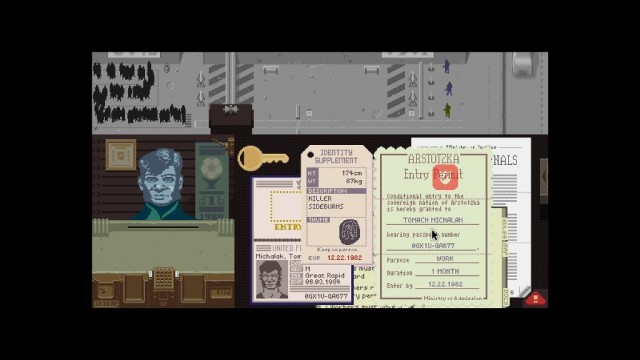
The regulations become more complex, and the list of required immigration documents entrants must have on them grows as the game progresses.
Americans love the totalitarian dystopia theme – especially for video game settings, but they seldom get it right. Most game designers to crib bits and pieces from Orwell’s writing but they rarely comprehend the subtleties. Their dystopian worlds are populated with characters with distinctly western, capitalist value systems who wouldn’t normally survive in such an environment. You very rarely see the distinct inversion of morality that is a taletale sign of an established oppressive regime: criminals are folk heroes while law abiding citizens are considered cowards.
This might be obvious, but I think it bears repeating, because writers and game designers very frequently miss this point. In an oppressive nation, laws are not made to serve and protect the citizens. The sole function of the legal system is to maintain the status quo and keep the current ruling class in charge while at the same time subdue and keep the general populace in check. They are not designed to be simple or enforceable: they are meant to be a maze that is impossible to memorize, navigate or follow. An average citizen will be breaking a dozen or so byzantine, arcane rules every day without meaning to do so – and this is by design. This way, everyone is guilty of something, and enforcement can be completely arbitrary. But the unspoken social contract is that if you keep your head low, do what you are told the police will turn a blind eye to your small transgressions. If however you step out of line, they will nail you fast and hard for all the illicit things you have already done. Breaking laws, and going against the state is therefore a tremendous risk. Anyone willing to bend the rules, even if only for selfish reasons is to be commended for their bravery. Anyone willing to break the rules to to help fellow citizens is a fucking saint. Criminal activity of any kind (regardless if it is smuggling, theft or political activism) becomes inherently admirable and heroic. Flowing the letter of the law on the other hand is cowardly and selfish. It is a strange, pathological kind of mentality in which hypocrisy and lies are crucial survival mechanisms.
It is a different kind of life: a surreal, strange existence because it is dictated and shaped by ideology that no one actually believes in, but everyone pays lip service to. It is a hard and sad life, but not devoid of humor. It is punctuated by dark irony the citizens grow to appreciate, or else it drives them mad.
Papers, Please gets all of this. It gets the sheer absurdity of life, and all the irony and silliness that comes with it. Playing it is a bit like diving head-first into Terry Giliam’s Brazil, sans the weird, psychedelic digressions. It is absurd, dark, witty, sad and highly amusing. It is a game about subtle nuances of life in a totalitarian state.
Take your booth for example: it was not designed for comfort or efficiency. It’s spartan decor, lack of space and convenience features are actually intentional. Managing your desk space, and minimizing clicks and mouse movements is actually part of the challenge. But it is not a bad UI design, because as the game progresses you are actually allowed to buy booth upgrades that fix a lot of the early game headaches (but you have to sacrifice your own savings). The sad state of your workspace however is a metaphor for the ineptness and pathology of the state. If they can’t design a silly little booth that isn’t a nightmare to work in, how can they run a nation.
Every day the people who enter your booth will ask you to bend the rules for them. You will hear all kinds of stories, ranging from silly to heart-wrenching. But you can’t help them all. Your performance is reviewed by the authorities, and each time you make a mistake or turn a blind eye, your pay is docked. So if you choose to be a good guy, chances are your family won’t have enough to eat, or that they will turn off the heat in your apartment. But if you choose to always follow the rules you then are yet another cog in the machine of oppression, and you are helping to destroy the lives of innocent people.
People you help, at a great personal risk to yourself and your family are not always grateful. More often than not they are rude, resentful and just plain nasty to you. However some do genuinely appreciate what you did for them, and will give you tokens of their appreciation, bribes or try to help you in other ways. Being a good guy is rarely glamorous, easy or risk free. Being a bad guy is easy but leaves a bad taste in your mouth. That, and it also affects which ending you are going to get. Papers, Please has about twenty alternate endings, all of which depend on your decisions: which people you let through, who you turn away, which organizations and factions you decide to side with. Compared to say the degree to which you can affect the plot in Mass Effect games, this is quite overwhelming. Not all endings are good or even satisfying. Many are actually quite terrible. But that’s how games should be: you choose your path, and you reap the benefits or suffer consequences of your choices. This is an absolutely right approach to moral choice in interactive fiction.
The game’s creator Lucas Pope groks totalitarian regimes. He got them so right, I actually looked up his background to see if, like me, he was born in one of the former soviet block nations. He was not, and that makes his understanding of the topic all that more impressive. He definitely did his research and immersed himself in that reality through literature, cinema and other source materials. All I can say is kudos. He also groks choice and consequences which is an extremely rare skill in the game design industry these days. Go get this game, play it and get all the fucking tokens because that’s the right thing to do.
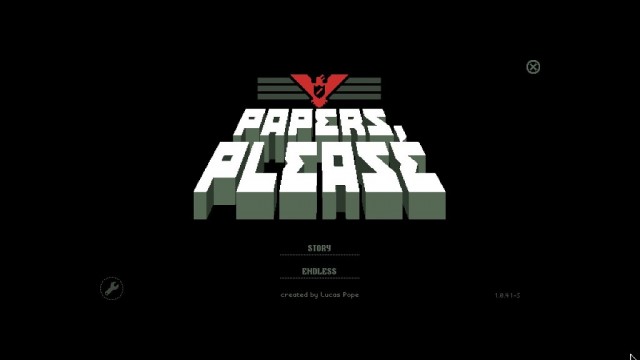
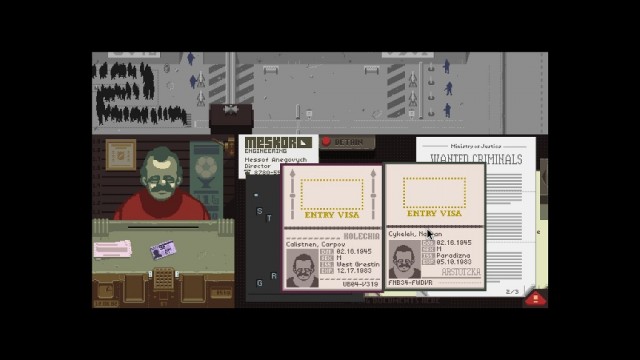
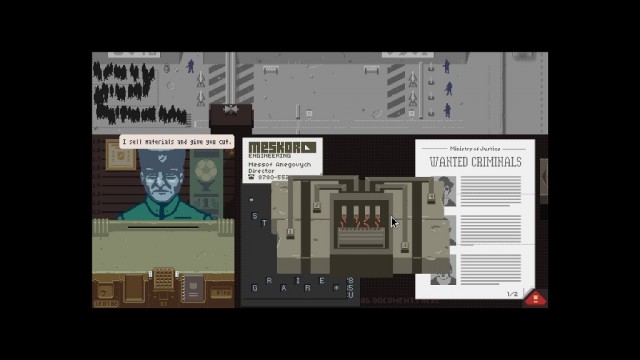
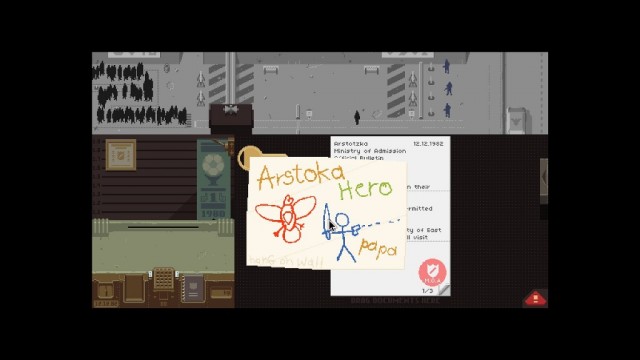
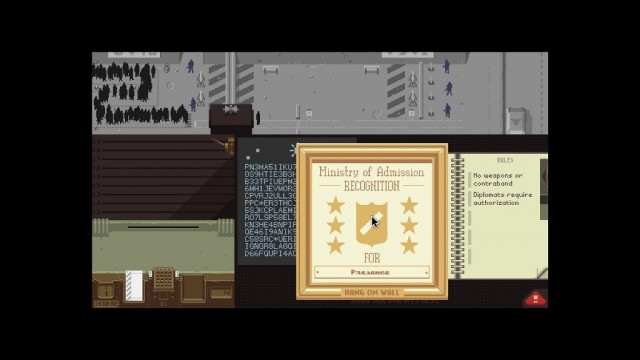

Wow! I wasn’t expecting something so insightful in the middle of an indie computer game review. That was really interesting, Luke. One of my college friends was from Romania, his family having fled to the US just before the fall of the communist regime. His stories sounded a lot like yours, and he would also get agitated at inaccurate western depictions/conceptions of the Eastern Bloc. He was extremely grateful to have escaped it.
Have you seen the sister game to Papers, Please: The Republia Times? In that one you’re a newspaper editor in Republia and you have to keep readership high as well as satisfy the state’s censorship demands. Does that game get the subtleties right, too?
Chris Wellons wrote:
Well, I think credit here goes to Lucas Pope for creating a game that lends itself so nicely to deeper analysis, and allows tangential discussions of it’s themes and motifs. When you review a game as entertainment then you are going to talk about the game itself, and not much beyond that. But when a game is a piece of art, the review naturally evolves into more introspective and thoughtful discussion about the things the game talks about. :)
I haven’t played Republia Times yet. I will check it out and report back. :)
Wow, looks interesting! Though to be truly authentic it shouldn’t have ‘please’ in the title :) When I get back to Ukraine, each time I look at grim faces of border control officers who look at me with suspicion: Why did you get back? Which flight were you on?
Great write up.
@ Victoria:
Heh, very true. That said TSA and immigration officers in US ain’t much better sometimes. Maybe there is something about airports that brings out the worst in people. :P
Luke, What you described in paragraph starting with :”This might be obvious….” is actually what is happening currently in the country i live in, Iran. You know, When you do sth. authorities do not confirm, they will call you up and show you documents saying that “WE ARE WATCHING YOU” . and may god help someone who does anything officially prohibited. (sorry for my bad english, an unfortunate language barrier)
and as you might know almost everything is extremely prohibited in Iran. A poor soul who’s been seen with a beer can, can be condemned to death. And women not wearing scarf are humiliated by Public Safety Police and sent to prison. There are many examples.
Our fucking totalitarian government aside, Reading some Bruno Schulz and Szymborska and watching some polish movies in college years, I fell in love with polish culture. I hope to see Warsaw in the recent future when traveling aboard becomes much easier.
@ reza:
It’s amazing how ideologies driving these systems can be completely different (communism is by nature secular and very anti-religion) and yet the mechanisms of oppression are always so similar.
If you end up in Warsaw, definitely check out the Old Town. It’s like walking though history. Also best ice cream place ever. You can pretty much just ask anyone there where the good ice-cream are and they will point you in the right direction. Most summers there is like a 15-20 minute queue in front of the place during peak hours. :) The Palace of Culture and Science, despite being the 6th tallest building in EU is kinda boring. Nice view from the top, but the whole thing is like a big, somber reminder of the soviet oppression (original name was “Josef Stalin’s Palace of Culture and Science”). So there’s that.
Hey Lucas this is a really cool read. It was good to see your take on this game (through the lens of your/your parents’ experience with the real thing). I haven’t played it (these days I prefer watching others play X) but I saw a review on the avclub and it seemed pretty interesting.
Pingback: Shelter | Terminally Incoherent
